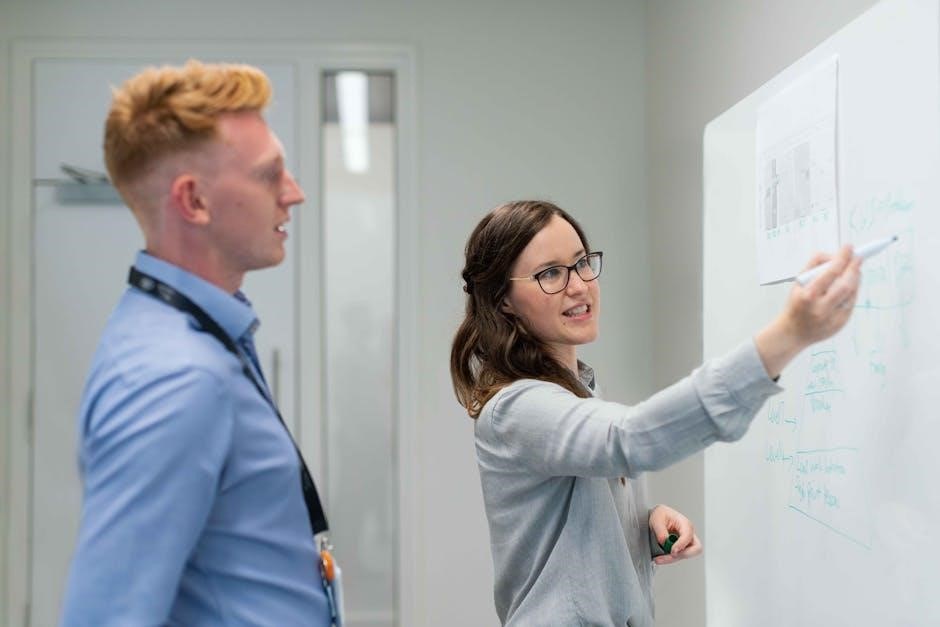This comprehensive guide by Michael M. Lombardo and Robert W. Eichinger offers practical tools and insights for personal and professional growth, targeting learners, managers, and mentors.
Overview of the Guide
FYI: For Your Improvement is a comprehensive development and coaching guide designed for learners, managers, mentors, and feedback givers. It provides insights into 67 key competencies, 19 career stallers and stoppers, and 7 global focus areas. Based on over 20 years of research, the guide offers practical tools for identifying development needs and creating effective coaching strategies. It includes self-assessment techniques, 360-degree feedback, and actionable tips for growth. Available in multiple editions, including the 6th edition, it remains a trusted resource for personal and professional development, helping individuals and organizations achieve lasting improvement and success.
Target Audience: Learners, Managers, Mentors, and Feedback Givers
FYI: For Your Improvement is tailored for learners seeking self-improvement, managers guiding teams, mentors providing expert advice, and feedback givers aiming to enhance others’ performance. It serves as a versatile resource for individuals at all career stages, offering practical tools and strategies. The guide helps learners identify strengths and growth areas, while equipping managers and mentors with effective coaching techniques. Feedback givers benefit from clear frameworks to deliver constructive insights, making it an essential tool for fostering professional development across various roles and industries, ensuring comprehensive and targeted growth opportunities for all users.
Understanding Competencies for Development
Competencies are essential skills and traits identified as crucial for success, forming the foundation of personal and professional growth. The guide outlines these development areas clearly.
The 67 Key Competencies for Success
The guide identifies 67 key competencies essential for personal and professional success, derived from extensive research. These competencies, such as leadership, communication, and problem-solving, are foundational for growth. They provide a clear framework for self-assessment and development, helping individuals identify strengths and areas for improvement. By focusing on these competencies, learners and coaches can create targeted development plans, addressing specific skills to enhance performance and achieve goals. This structured approach ensures a comprehensive path to continuous improvement and lifelong learning. The competencies serve as a roadmap for overcoming career challenges and sustaining long-term success.

Identifying Development Needs
Identifying development needs involves self-assessment and feedback to pinpoint growth areas. This crucial step guides the creation of effective development strategies tailored to individual goals and aspirations.
Self-Assessment and Recognition of Growth Opportunities
Self-assessment is a cornerstone of personal development, enabling individuals to identify strengths, weaknesses, and areas for improvement. By reflecting on performance and feedback, learners can recognize growth opportunities and align them with career goals. This process fosters self-awareness, a critical skill for effective development. The guide provides practical tools and frameworks to facilitate honest self-evaluation, helping users pinpoint where they excel and where they need to grow. Recognizing growth opportunities allows individuals to take ownership of their development, creating a clear path for progress and continuous improvement. This step is essential for crafting meaningful development plans.
Using 360-Degree Feedback for Personal Insight
360-degree feedback is a powerful tool for gaining insights into individual performance and behavior. By collecting input from managers, peers, direct reports, and others, this method provides a well-rounded perspective. The guide emphasizes how to effectively use this feedback to identify strengths, address blind spots, and align development efforts. It offers practical strategies for interpreting feedback, fostering self-awareness, and creating actionable plans. This approach ensures that learners gain a deeper understanding of their impact and can make targeted improvements. Leveraging 360-degree feedback enhances personal growth and aligns development with organizational expectations.

Creating a Personal Development Plan
Creating a personal development plan involves setting clear, actionable goals aligned with your strengths and growth areas, ensuring a focused path toward continuous improvement and skill enhancement.
Setting SMART Goals for Improvement
Setting SMART (Specific, Measurable, Achievable, Relevant, Time-bound) goals is essential for effective personal development. These goals provide clarity and direction, ensuring efforts are focused and meaningful. The guide emphasizes aligning goals with personal strengths and growth areas, fostering accountability and motivation. By breaking objectives into manageable steps, individuals can track progress and celebrate milestones. Regularly reviewing and adjusting SMART goals ensures they remain relevant and attainable, guiding continuous improvement and skill enhancement. This structured approach helps individuals stay on track, fostering lasting growth and self-improvement.
The Role of Coaching in Development
Coaching plays a vital role in fostering personal and professional growth by identifying strengths and development areas, using tools like assessments and stakeholder feedback.
Effective Coaching Techniques and Strategies
Effective coaching involves active listening, open-ended questions, and tailored feedback to foster self-awareness and growth. Coaches use assessments and stakeholder insights to identify development areas, helping individuals set realistic goals. Techniques include creating safe spaces for exploration, encouraging reflection, and providing actionable strategies. The guide emphasizes the importance of balancing support with accountability, ensuring sustainable progress. By leveraging these methods, coaches empower learners to overcome challenges and achieve lasting improvement, aligning personal growth with organizational success.

Implementing the Development Plan
Implementing the development plan involves tracking progress, adjusting strategies, and leveraging resources to ensure continuous growth and alignment with goals.
Tracking Progress and Adjusting Strategies
Tracking progress and adjusting strategies are crucial for effective development. Regular assessments and feedback help monitor growth, ensuring alignment with goals. The guide emphasizes flexibility, allowing individuals to adapt plans based on feedback and changing circumstances. Celebrating successes and addressing setbacks are key to maintaining momentum. By leveraging the 67 competencies and overcoming obstacles, individuals can refine their approaches and achieve lasting improvement. This iterative process ensures continuous growth and maximizes the impact of development efforts. Adjusting strategies fosters resilience and adaptability, essential for long-term success in both personal and professional contexts.
Overcoming Obstacles to Growth
Identifying and addressing career stallers and stoppers is essential for sustained growth. Strategies include self-awareness, feedback, and aligning development plans with personal and organizational goals effectively.
Addressing Career Stallers and Stopppers
Addressing Career Stallers and Stoppers
The guide identifies 19 Career Stallers and Stoppers that hinder professional growth. These include issues like lack of accountability, poor interpersonal skills, and resistance to change. Strategies to overcome these obstacles involve self-assessment, feedback, and targeted development plans. The guide emphasizes understanding root causes and implementing actionable steps to address these challenges. By focusing on personal awareness and growth, individuals can transition from being stuck to achieving sustained success. Practical tools and frameworks are provided to help individuals and coaches create effective strategies for overcoming these common career derailers. Continuous learning and adaptation are key to long-term development and avoiding stagnation in one’s career journey.

Sustaining Growth and Continuous Improvement
Lifelong learning and adaptation are crucial for sustained growth. The guide emphasizes continuous self-improvement through feedback, learning from experiences, and staying adaptable to evolving professional demands.
The Importance of Lifelong Learning and Adaptation
Lifelong learning and adaptation are essential for continuous growth and relevance in a rapidly changing world. Embracing new knowledge and skills fosters resilience and a growth mindset, enabling individuals to navigate evolving challenges and opportunities effectively. Adaptation ensures alignment with shifting professional demands, while learning reinforces personal and professional development. By prioritizing these practices, individuals can stay competitive, innovative, and better equipped to thrive in dynamic environments, ensuring sustained success and fulfillment over time.
“For Your Improvement” equips individuals with practical tools and insights, empowering them to embrace growth, adapt to change, and achieve lasting success in their personal and professional lives.
Final Thoughts on Development and Coaching
“For Your Improvement” underscores the importance of continuous learning and adaptability in fostering personal and professional growth. By providing a structured framework and practical strategies, this guide empowers individuals to identify strengths, address weaknesses, and create actionable development plans. Coaches and mentors play a pivotal role in this journey, offering guidance and support to maximize potential. The emphasis on evidence-based competencies and real-world applications makes this resource invaluable for anyone seeking sustainable improvement and long-term success in an ever-evolving landscape.
